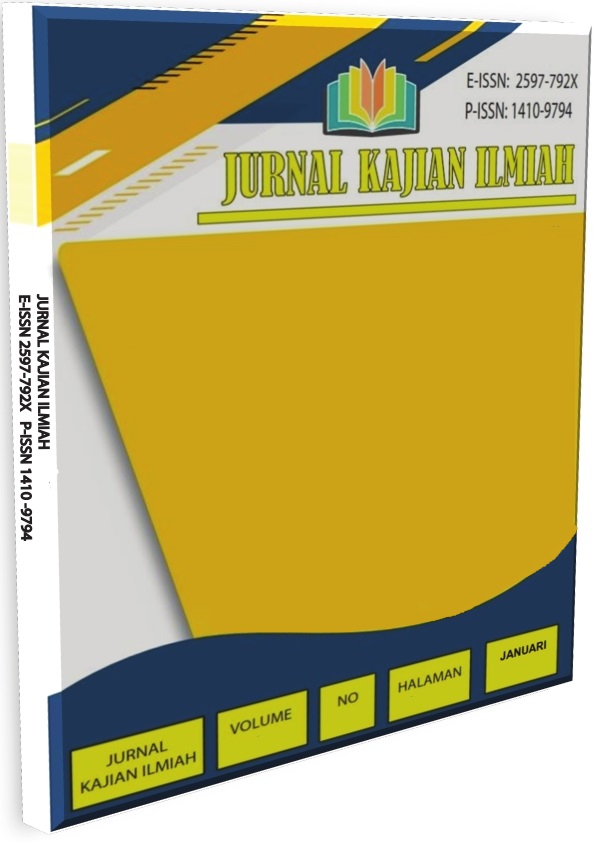Optimisme Mahasiswa Universitas Bhayangkara Jakarta Raya Yang Menjalani Perkuliahan Daring Di Tengah Pandemi Covid-19
DOI:
https://doi.org/10.31599/tgv7eh59Keywords:
Covid-19, Online Lectures, OptimistAbstract
The covid-19 crisis has forced education sisytems to find alternative face-to-face instrunction. As a result online lectures have been used by teachers and students. There are many problems faced by students when taking online lectures that can have negative impact on the continuity of lectures. Students must be optimistic in dealing with problems that occur during lectures in the midst of Covid-19 pandemic. This study aims to determine the level of students optimism during online lectures. This study involved 100 Bhayangkara Jakarta Raya college students. The result of this study indicate that the highest score of students optimism is at a high level with a value of 76%, and 24% of students are in the moderate category of optimism. The average level of students optimism is in the high category, meaning that students have confidence in facing all obstacle while undergoing online lectures.
Downloads
References
Bakia, M., Shear, L., Toyama, Y., & Lasseter, A. (2012). Understanding the implication of Online Learning for Educational Productivity. Educational Technology. 1-75.
Hanssen, M. M. Et al. (2015). Optimism, Motivational Coping and Well-Being: Evidence Supporting the Importance of Flexible Goal Adjusment. Journal of Happines Studies. Springer Netherlands, 16(6). 1525-1537.
Hart, C (2020). Factors Associated With Students Presistence in an Online Program of Study: A Review of the Literature. Journal of Interactive Online Learning. 11(1). 19-42.
Hasnayati, A., Pramesti, C., A., Adam, F. T., & Noorizki, R. D. (2020). Tingkat Optimisme pada mahasiswa universitas negeri malang. In Seminar Nasional Psikologi UM. 1(1).
Isaa, R., & Jaaron, A. A. M. (2017). Measuring e-learning readlines: The case of Palestinian public secondary schools. International journal of technology enchanced learning, 9(4), 319-338.
Kementrian kesehatan republik indonesia. (2020). Hindari lansia dari covid-19. Diakses dari htttp://www.padk.kemkes.go.id/article/read/2020/04/23/21/hindari-lansia-dari-covid-19.html
Kementrian Pendidikan dan Kebudayaan (2020). Surat edaran jenderal pendidikan tinggi kemendikbud nomor 1 tahun 2020. Diakses dari http://lldikti3.kemendikbud.go.id/v6/wp-content/upload/2020/04/Surat-Edaran-Direktorat-Jenderal-Pendidikan-Tinggi-Kemdikbud-Nomor-1-Tahun-2020-3.pdf
Macdonald, L. (2018). You Can Be an Optimist. New York: The Rosen Publishing Group, Inc.
Mukaromah, V. F. (2020). Update virus corona dunia 2 mei: 3,4 juta orang terinfeksi, 1,08 juta orang sembuh diakses dari http://www.kompas.com/tren/read/2020/05/02/071440965/update-virus-corona-dunia-2-mei-34-juta-orang-terinfeksi-108-juta-orang.html
Munawaroh, E. B. I., Nugraheni, E. P., Sofyan, A., Utomo, D. P., & Arinata, F. S. (2020). College Students Academic Resilience Profile. International journal of scientific & technology research. (9), ISSN 2277-8616.
Periantolo, J.(2016). Penelitian Kuantitatif Untuk Psikologi. Januari: Pustaka Pelajar.
Purwanto, A. et al. (2020). Studi Eksploratif Dampak Pandemi Covid 19 terhadap Pembelajaran Online di Sekolah Dasar. Journal of Education, Psychology and Counseling. 2(1), 1-12.
Sabouripierpour, F. & Roslan, S. B. (2015). Resilience, Optimism, and Social Support among International Students. Canadian Cender of Science and Education. 11, (15) ISSN 1911-2017.
Sari, D. (2020). Peran Adaptif Tiga Universitas di Jabodetabek dalam menghadapi Sistem Belajar Online selama pandemi COVID 19. 25-32.
Seligman, M. E. P. (2008). Menginstal Optimisme. Bandung: Salamadani












_-_Copy1.jpg)




